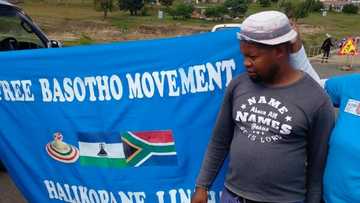Explained: DA Leader John Steenhusien Looks Into How Russia's War in Ukraine Will SA's Economy
- Since the invasion of Ukraine by Russia, a number of countries have made the decision to place sanctions on Russia
- While sanctions on Russia are meant to impact the country negatively, they also pose serious economic challenges to South Africa as well
- South Africa's economy could potentially face record-high fuel prices, food security could be threatened and electricity prices could increase again
PAY ATTENTION: Click “See First” under the “Following” tab to see Briefly News on your News Feed!
Experts and prominent politicians have been raising concerns about the impact Russia's invasion of Ukraine will have on the rest of the world. One of the main concerns that have come up is how much more expensive staple food items will become the longer the war continues.
Many countries across the globe have now reacted to Russia's attack by placing various economic sanctions on the country, which could be expected to have a trickle-down effect on the rest of the world.
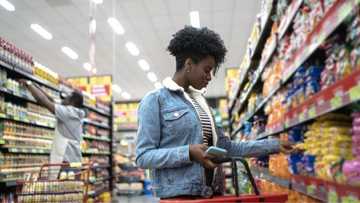
Read also
Wheat, maize meal and other food prices set to skyrocket, say Weetbix and Sasko manufacturers
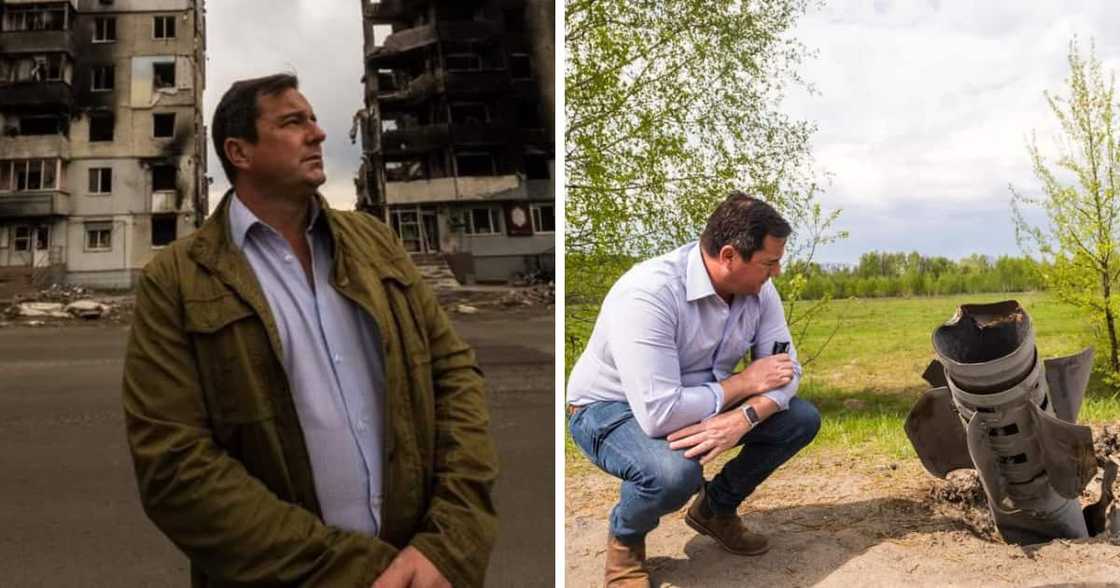
Source: Twitter
Why DA leader John Steenhuisen is concerned that the price of sunflower oil will skyrocket because of the war in Ukraine
Recently, the leader of the Democratic Alliance visited the war-stricken country of Ukraine on what he calls a fact-finding mission. Following his return to South Africa, Steenhuisen explained why he visited Ukraine and listed some of the impacts the war in Ukraine has on South Africa.
PAY ATTENTION: Never miss breaking news – join Briefly News' Telegram channel!
Steenhuisen stated in a media briefing that the effects of the war on Ukraine will take a long time to overcome. He stated that the effects on Ukraine's agriculture sector will have a trickle-down effect on Mzansi because Ukraine is one of the world's biggest producers of sunflower oil, reports TimesLIVE.
“This is a global issue. Ukraine is the largest producer of sunflower oil, third-largest producer of corn and among the top five producers of wheat in the world. Africa as a continent is dependent on grains from this region," stated Steenhuisen.
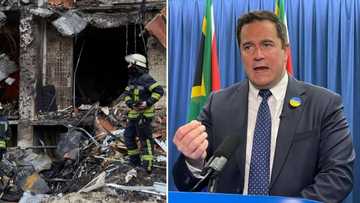
Read also
John Steenhuisen pressuring ANC to align with Ukraine following his fact finding trip to the war torn country
Steenhuisen says the rise in prices on food items such as cooking oil, maize meal and wheat products will negatively impact poor South Africans the most. The DA leader says if South Africa does not step in improvised people will die because they will not be able to afford food staples.
Steenhusien says the South African government needs to side with Ukraine and can no longer remain neutral in the situation.
According to BusinessInsider, the price of sunflower oil has increased by 55%, while the price of Canola oil has increased by 40% as a result of the war. Morne Botes, commercial director for SOILL, a company that owns B-Well and African Gold oil brands says more increases in cooking oil will come at a later stage because of Russia's invasion.
How Russia's invasion of Ukraine will increase fuel prices
While the Russia-Ukraine conflict might seem far removed from South Africa it is important to note that tensions between the two countries could have an economic impact on the country. The impact started relatively fast and within a day of the invasion, the price of Brent crude oil started trading at $100 per barrel.
The rand also took a hard hit and dropped by 30c, which saw the rand trading at around R15.27 to the dollar and R17.17 to the euro as a result of the invasion.
The increase in Brent crude oil also means that fuel prices in South Africa are also expected to increase drastically in the month of March. This means the price of petrol cost South Africans more than R21 per litre at the time, according to BusinessTech.
With the Rand being a little unstable, Economist Dawie Roodt predicts that June fuel prices could go up to a record-high R22.50 per litre, reports EWN. A number of factors will influence the price hike such as the increased price of Brent Crude and the reintroduction of the fuel levy.
The fuel levy was temporarily suspended by the Minister of Finance Enoch Gondongwana to lessen the blow of high fuel prices.
How Russia's invasion of Ukraine affects the price of maize and wheat
The Russia-Ukraine conflict poses a huge concern for food security in South Africa because the two countries are major exporters of wheat and maize meal. According to Fin24, between 2019 and 2020 approximately 30% of South Africa's wheat imports came from Russia and Ukraine.
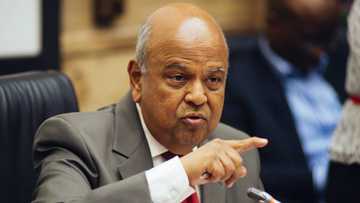
Read also
Public Enterprises Minister Pravin Gordhan suggests a ban on the sale of scrap metal to preserve infrastructure
While South Africa does have the capabilities to produced wheat, it is not enough to meet the supply needed by the entire country. Wheat is only produced in three provinces, namely the Western Cape in the winter and the North West and Free State in the summer.
The Bureau for Food and Agricultural Policy (BFAP) also notes that Russia and Ukraine are not just major suppliers of wheat and maize meal for South Africa only but for the African continent as a whole.
In 2020, 90% of Africa's agricultural import from Russia was wheat and the largest of Africa's agricultural import(48%) from Ukraine was wheat and a third was maize meal.
With such a reliance on imports from both countries for basic agricultural goods, there is a concern that wheat and maize prices could skyrocket and that could lead to a global food price inflation.
Why South Africa's electricity price could increase due to Russia's invasion of Ukraine
The National Energy Regulator of South Africa (Nersa) recently granted Eskom the green light to increase electricity tariffs by 9.5% starting in April, however, should the tensions between Russia and Ukraine continue the power utility might be forced to increase tariffs by 40%.
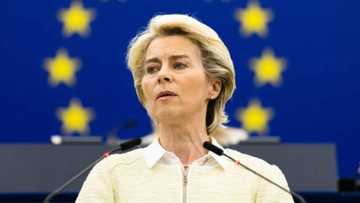
Read also
“It won’t be easy”: European Union proposes ban on Russian Oil, hints that tougher times are to come
This is according to Professor Emeritus of International Law Professor André Thomashausen, who explains that prices in the energy market could skyrocket should Russia make the decision to move away from European markets to China, reports IOL.
Thomashausen explains that international energy prices could also increase should EU prices skyrocket and this will in turn impact Eskom's energy production which is dependent on the import of diesel.
This could have a devastating effect on all the parameters of the current budget and sink South Africa’s hopes for a post-Covid economic recovery,” said Thomashausen.
How South Africa's mining sector could benefit from the war in Ukraine
Speaking on eNCA, Azar Jammine, director and chief economist at Econometrix, says in the short term, South Africa might benefit from the Russia-Ukraine conflict more than other countries because SA exports the same minerals as Russia.
"A lot of the minerals that Russia exports are precisely the same ones that South Africa exports. As a result, we are likely to see a rise in the prices of some of these metals and minerals," says Jammine.
Jammine warns that the rise in prices for commodities could decrease in the long term and South Africa should not depend on the short term outcome for sustained economic growth.

Read also
DA Leader John Steenhuisen's fact finding trip to Ukraine stirs mixed reactions: "Come home wena"
When did Russia's war in Ukraine begin
In the early hours of Thursday morning, 24 February, Russian President Vladimir Putin realised the fears of many world leaders and Ukrainian citizens by announcing that Russian soldiers would be invading Ukraine. The Russian president also warned other world leaders that should they try to intervene in his efforts, they could face severe consequences.
Putin's decision comes after months of speculation that Russia was making preparations to invade Ukraine by establishing military training posts near Ukrainian borders.
In the months leading to the invasion, world leaders such as US President Joe Biden attempted to hold talks with Putin, which proved to be unsuccessful.
Ukraine police stop people fleeing, SA citizens stranded
Briefly News earlier reported that South African citizens in Ukraine were advised to try to get to Poland, as the embassy there would assist them in returning home. However, they have now been warned of Ukrainian police stationed at the Polish border who are preventing South Africans from leaving Ukraine.
According to SABC News, a group member, Kelebogile Makoro, posted online about her ordeal in trying to cross the Ukraine-Poland border. Makoro said that she was shoved by the police and left to wait outside in the cold while Ukrainians were allowed to cross the border.
The reason why South Africans are not being prioritised is that there has been no evacuation order for South African citizens from Ukraine, but Ukrainians do have an evacuation order. Hungary has responded by offering refuge to South Africans who want to leave Ukraine.
Source: Briefly News

